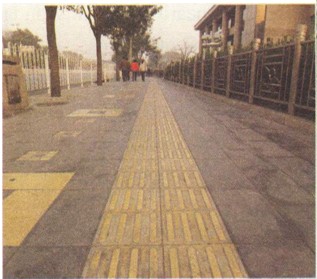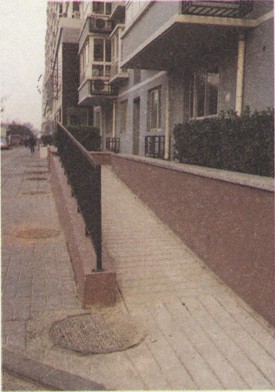-
(单词翻译:双击或拖选)



EQUAL ACCESS
Every member of society has the right to education, employment1 and a reasonable quality of life. As society develops, we have both the opportunity and responsibility to make sure that people with disabilities can live productive2 and meaningful lives. That means that we must make sure that our streets and public buildings, such as government offices, schools, hospitals, cinemas and libraries, are safe and accessible to all of us.
STREETS
The streets in our cities should be clean, in good repair and safe. To make sure that blind people can find their way around our cities, we must provide street stones and markers that help them get where they are going. Special stones can be used to show paths and crossings. For those who are in wheelchairs, we should provide level streets and easy access to sidewalks and stores. The ground should be even and hard, and there should be no unmarked holes or other dangers. Signs and traffic lights must be well-placed and easy to read and use.
PUBLIC BUILDINGS
Public buildings must also be accessible and safe. There must be enough room for wheelchairs, and all parts of the building must be accessible. It is important to make sure that doors and entrances are easy to reach from the street. The path should be flat and even, and if there are any steps, they should be covered with a board so that wheelchairs can enter the building. Doors should be at least 80 cm wide and there should be enough space so that the door can be opened by a person sitting in a wheelchair.Public telephones, buttons for elevators and other facilities should be placed so that they can be reached from a wheelchair. Entrances should be easy to find and well-lighted for people who do not see very well. Glass doors should be marked at eye level to prevent accidents. It is also important that the shape of the room is easy to recognise and that there are not any objects that may confuse people. For example, the colour or shade of walls, floors and doors should be different enough so that the shape of the room is clear. There should be no large mirrors or windows letting in sunlight that may make it harder to see. It is also important that any special places, such as bathrooms or entrances for disabled persons, are conveniently located, clearly marked and made to look as pleasant as possible.
HOMES
When we design buildings, we should keep in mind that there should be apartments that are suitable for disabled persons. All entrances and public areas in apartment buildings must be accessible and there should be parking spaces near the entrances. Apartments for people in wheelchairs should be on the ground floor unless there is an elevator; if there is an elevator, it should be large enough and easy to operate.
The interior3 of the apartments should also be designed properly. Light switches, electrical outlets4, door handles, sinks and other fixtures5 should be placed at a convenient height so that someone in a wheelchair can reach them. Bathrooms, kitchens and hallways should be large and wide enough so that a wheelchair can be turned around. Special features, such as doorbells that use light rather than sound, must be used in apartments for people with hearing difficulty, and there should be wiring that makes it possible for people to use text- telephones and other aids.
Perhaps most important, we must provide equal "intellectual6 access" for disabled people. That means that everyone, disabled or not, should have equal access to schools, universities, jobs and political organisations. Providing equal access requires thought, work and money and may seem expensive. We must remember, however, that the cost of not providing equal access is far greater.
 收听单词发音
收听单词发音
1
employment

|
|
| n.雇用;使用;工作,职业 | |
参考例句: |
|
|
|
2
productive

|
|
| adj.能生产的,有生产价值的,多产的 | |
参考例句: |
|
|
|
3
interior

|
|
| adj.在内的,内部的,内地的,国内的;n.内部 | |
参考例句: |
|
|
|
4
outlets

|
|
| n.出口( outlet的名词复数 );经销店;插座;廉价经销店 | |
参考例句: |
|
|
|
5
fixtures

|
|
| (房屋等的)固定装置( fixture的名词复数 ); 如(浴盆、抽水马桶); 固定在某位置的人或物; (定期定点举行的)体育活动 | |
参考例句: |
|
|
|
6
intellectual

|
|
| n.知识分子;adj.智力的,理智的,有理解力的 | |
参考例句: |
|
|
|

















